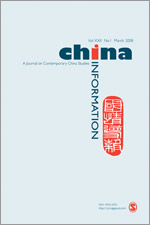GS
Dr Giorgio Strafella
Senior Research Fellow
Chinese Culture and Society, SHSS, University of St.Gallen (HSG)
St.Gallen, Switzerland
Biografie
In 2014 I obtained a PhD in Contemporary Chinese Studies from The University of Nottingham with a thesis on the language of Chinese intellectual inquiry. I previously studied at the Università degli Studi di Milano, where I wrote an MA dissertation (2007) on the relation between external corporate communication and political discourse in China. Since September 2011 I work as a researcher and teaching assistant for the Chair of Chinese Culture and Society at the University of St. Gallen. I am now a Senior Research Fellow at the same university where, beside doing research, I also teach courses on contemporary China.
Publikationen (8)
Ai Weiwei’s #Refugees: A Transcultural and Transmedia Journey
After spending years advocating for human and civil rights in China, Ai Weiwei is now employing his artistic abilities and his sizeable social media presence to sensitise the West to the plight of the refugees who attempt to reach Europe from the Middle East and Africa. In doing so, he is putting
European governments rather than the Chinese state ‘on trial’ while adding a ‘transcultural’ dimension to his work. Still, even his most recent
endeavours stem from the same philosophy he has espoused throughout his career.
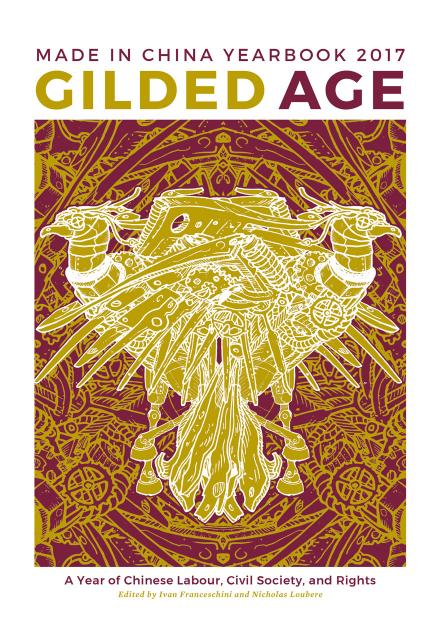
Trasformazione urbana e dibattito intellettuale a Shanghai negli anni Novanta del ventesimo secolo
I primi anni Novanta del secolo scorso rappresentano uno spartiacque per la trasformazione — o il «remake» (Bergère: 2005) — di Shanghai da città di operai e studenti a centro finanziario e commerciale. Se le politiche di Mao Zedong in materia di sviluppo economico avevano posto un’enfasi particolare sul ruolo delle province interne della Repubblica popolare, mirando all’industrializzazione di un paese largamente contadino e rivoluzionando così la distinzione tra centri urbani e vita rurale, a partire dai primi anni Ottanta Deng Xiaoping sposta il baricentro dello sviluppo economico verso la regioni costiere (Friedman: 2005). È tuttavia solo negli anni Novanta che Shanghai diviene fulcro e vetrina delle politiche di riforma e apertura denghiste. Questo saggio analizza il contesto sociale e le ragioni politiche di questa decisione, e con ciò di interpretare la reazione particolarmente inquieta da parte degli intellettuali di Shanghai al mutato contesto socio-politico e culturale.
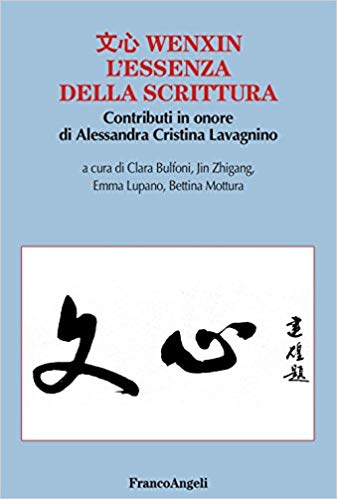
Intellectual Discourse in Reform Era China: The Debate on the Spirit of the Humanities in the 1990s
This book explores intellectual discourse in reform era China by analysing the so-called “debate on the spirit of the Humanities”, which occurred in the years 1993-95, and which is recognised by scholars as one of the most interesting, influential and important debates of the 1990s. This debate, in which Chinese intellectuals reflected on reform-era mass culture and on their role in society, was the first debate in China after the crackdown of 1989 and the launch of new economic reforms after Deng Xiaoping’s 1992 “southern tour”. The book, drawing on a large corpus of texts and a wide range of individual positions, demonstrates how Chinese intellectuals, having to face the combination of political repression and economic liberalisation, conceptualised and reacted to both. The book reveals the scale and complexity of the debate, the nature of intellectual life in China, the status and relevance of intellectual voices in society, the divisions within the intellectual sphere as well as shared concepts and ideals, and how the key factors of political repression and economic liberalisation which remain central in China today were defined and articulated.
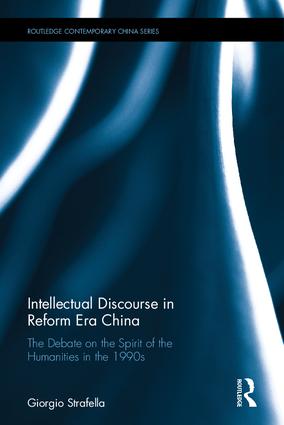
Postmodernism as a Nationalist Conservatism? The Case of Zhang Yiwu
The adoption of postmodernist and postcolonial theories by China’s intellectuals dates back to the early 1990s and its history is intertwined with that of two contemporaneous trends in the intellectual sphere, i. e. the rise of conservatism and an effort to re-define the function of the Humanities in the country. This article examines how these trends merge in the political stance of a key figure in that process, Peking University literary scholar Zhang Yiwu, through a critical discourse analysis of his writings from the early and mid-1990s. Pointing at his strategic use of postmodernist discourse, it argues that Zhang Yiwu employed a legitimate critique of the concept of modernity and West-centrism to advocate a historical narrative and a definition of cultural criticism that combine Sino-centrism and depoliticisation. The article examines programmatic articles in which the scholar articulated a theory of the end of China’s “modernity”. It also takes into consideration other parallel interventions that shed light on Zhang Yiwu’s political stance towards modern China, globalisation and post-1992 economic reforms, including a discussion between Zhang Yiwu and some of his most prominent detractors. The article finally reflects on the implications of Zhang Yiwu’s writings for the field of Chinese Studies, in particular on the need to look critically and contextually at the adoption of “foreign” theoretical discourse for national political agendas.
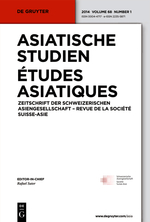
Transforming Book Culture in China, 1600-2016
The volume presents the latest findings on Chinese book culture from top international research. The fifteen contributions by leading scholars provide a panorama of the latest trends, trying to create a roadmap to enhance our understanding of China’s book culture in the past and in the present.
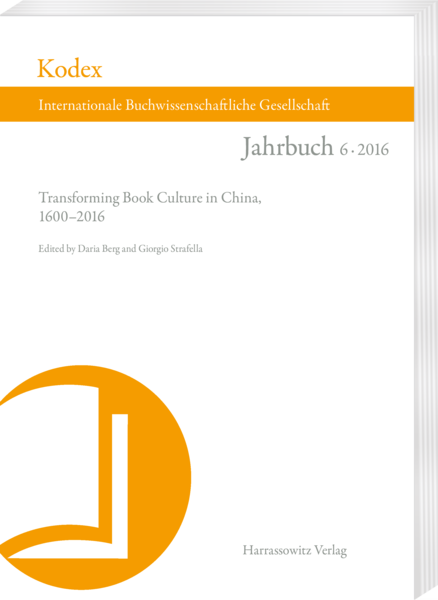
“Twitter Bodhisattva”: Ai Weiwei’s Media Politics
This article investigates artist and activist Ai Weiwei’s media politics. In 1997 Ai Weiwei imagined a modernist movement that would practise a “non-compromising vigilance on society and power” and since 2005 he has embraced blogging and micro-blogging to enact such intent. We argue that his “communication activism” is part of a broader artistic and political program that long predates his online presence. The study examines how the artist has experimented with blogging and micro-blogging to spread his message of “awakening” in defiance of censorship and surveillance. It shows how Ai Weiwei’s communication strategy combines an international celebrity status, criticism, irony and a round-the-clock interaction with his netizen audience and the media. It also critiques the effectiveness and coherence of this mode of activism from two perspectives – namely, Jean Baudrillard’s analysis of “private telematics” and Jodi Dean’s “blog theory” – and finally assesses its impact. The study aims to enhance our understanding of the web-based communication strategies of Chinese activists, shedding light on cultural production and consumption in Chinese cyberspace as a socio-political barometer.
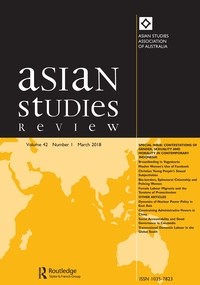
“Marxism” as Tradition in CCP Discourse
This study discusses how the Chinese Communist Party has fashioned “Marxism” as a tradition during the last three decades. I argue that its leaders have invented the tradition of Sinicised Marxism by means of a ritualised repetition that emphasises a largely factitious continuity with the purpose of legitimising the Party, justifying policy changes and winning factional struggles. The point is corroborated by an analysis of the invocation of “Marxism” during key political phases in the reform era when the pretence of continuity became crucial for the CCP, including 1978–1985, 1992–1995 and the Eighteenth Party Congress of 2012. The article shows how, in the debates on “the criterion of truth” and “Marxist humanism”, the reformists endorsed a re-definition of Marxism that aimed at saving communism from radical Maoism and legitimising the new policies. Next, I examine texts from the beginning of the second reform period, when official propaganda strove to justify the roll-out of a market economy by portraying “pragmatism” as the essence of Marxism. Finally, I analyse how Party-state leaders have invoked Marxism around the time of the last leadership transition. The article suggests that such a use of “Marxism” in contemporary official discourse originates from Mao Zedong Thought as well as in a gradual hollowing out of the concept. As a result it sheds light on the ideological undertows of China’s contemporary socio-political history and on the chances of future political change.

The making of an online celebrity: A critical analysis of Han Han’s blog
In the ‘society of the spectacle’, according to Guy Debord, ‘smug acceptance of what exists can also merge with purely spectacular rebellion’ and dissatisfaction itself becomes a commodity. Drawing on his reflections on celebrity and the spectacle, this article analyses the highly popular blog of novelist and racing car driver Han Han (born 1982). By doing so, it explores the relation between Han Han’s celebrity and his voice as a social critic. The analysis focuses on how Han Han’s blog thrives on the combination of his celebrity status and Everyman image; how it contrasts ‘anti-intellectualism’ in the tradition of Wang Shuo (born 1958) with elements of literati ideology including moderate loyal criticism and cultural nationalism; and how it negotiates the tension between commercial spectacle and the expression of sociopolitical concerns. The article also argues that unlike citizen journalism, Han Han’s blog relies on editorial commentary on hot topics and acts as a ‘safety valve’ blog. This article aims to contribute to understanding the rise in China’s cybersphere of a celebrity who merges the images of rebel, opinion leader and cultural entrepreneur.
